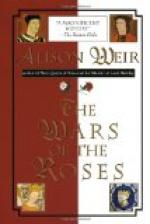There was no great issue at stake in these disastrous wars; no burning question was settled by the victory of either side; no great principle or national interest was involved. It was little more in reality than the struggle for supremacy and place amongst the overbearing and ambitious nobles; hence the ease and readiness with which they changed sides on every imaginable pretext, and the hopeless character of the struggle, which ruined and exhausted the country without vindicating one moral or national principle.
But Paul Stukely, at twenty years of age, was not likely to take this dispassionate view of the case. His whole heart was in the cause of the Red Rose, and he could scarce listen to these quiet but telling words without breaking out into ardent defence of the cause he had at heart.
“But listen, good mistress,” he exclaimed eagerly, when she had ceased to speak: “there are better days dawning for the land than they have seen either beneath the rule of the gentle Henry or the bold but licentious Edward. His blessed majesty has no love for the office of king, and his long captivity has further weakened his health and increased his love for retirement. You speak truly when you doubt if he will ever rule this turbulent nation, so long torn with strife and divided into faction. But think—he need not sway the sceptre which has proved too heavy for his hands. He has a son—a fair and gallant prince—worthy of the royal name of Edward which he bears. Men say that it will not be the feeble father who will restore order to the country and bring peace again to its shores, but that the task will be intrusted to the youthful Edward, who in his person combines the graces of his stately mother and the warlike prowess of his great ancestor whose cognizance he bears. Trust me, good people, if you love not Henry you will love Henry’s son; and will it not be better to be ruled by him than by that other Edward of York, the usurper, who, though I verily believe he can be a lion in battle, yet spends his days, when not in arms, in lolling in idleness and luxury amid his fine court beauties, and beseems himself rather as a woman than a man? I would fain serve a spotless prince, such as our noble Prince of Wales is known to be, than one whose life is stained by the debaucheries of a luxurious court, and gluttony such as it is a marvel even to hear of.”
Joan’s eyes lighted, as the youth spoke with all the ardour of a young and vivid imagination and a generous and undoubting love. Even the grave-faced woman at the spinning wheel smiled to herself, and though she heaved a little sigh, she answered gently enough:
“Ay, young sir, if that could be! If we could be ruled by one who was brave, and stainless, and wise, and just, then England might count itself a happy land indeed; but I have lived through troublous times, and I have lost hope in such a speedy and happy conclusion to the matter. But we shall see—we shall see.”




